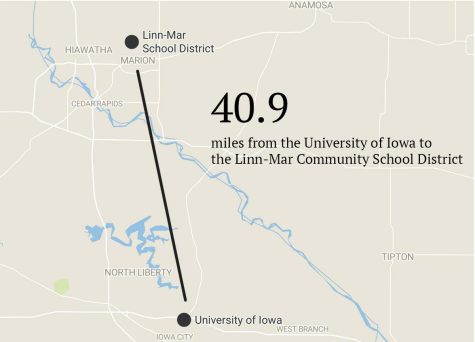‘I couldn’t stand living in my own skin’: Among a nationwide trend of anti-trans legislation, Iowa leads the pack
Iowa’s Republican party expanded its control over the statehouse. Transgender Iowans could face discriminatory laws this next legislative session.
V Fixmer-Oraiz, a transgender citizen and Johnson County Supervisor, speaks during a transgender rights protest at the Pentacrest on March 11. Simon Reichel attended the protest.
Content Warning: This article mentions references to self-harm and suicide as well as transphobia.
Growing up in Dubuque, Iowa, Simon Reichel said he faced harassment and violence because of his identity. After coming out to his family and friends at 15 years old, he said his parents verbally abused him for being a transgender male and called him the “antichrist.”
Reichel said he didn’t feel accepted by adults during his adolescence. He said, however, that he received support from friends and a handful of his Catholic high school faculty members.
Now a recent graduate from the University of Iowa, Reichel found a welcoming and accepting community in Iowa City, where he resides while working as a cook in the Hillcrest Residence hall during his post-graduation job search.
Reichel said he found a safe community, but he added that many transgender Iowans aren’t so lucky.
In recent years, anti-transgender legislation and campaign rhetoric has increased among Republicans nationwide and in Iowa.
Iowa Republicans in the 2022 legislative session introduced several bills that never made it to the governor’s desk due to procedural rules. Such legislation would have banned medical gender-affirming measures like hormone replacement therapy and puberty blockers, restricted the use of public bathrooms at public schools to the facilities that align with one’s biological sex, and removed gender identity as a protected status from Iowa’s civil rights code.
Iowa Republicans introduced 14 bills in total relating to transgender people.
While many of the bills failed to pass out of committee during the most recent legislative session, the handful of Republican legislators that introduced these bills won their reelection by a landslide.
In the 2022 legislative session, over 130 bills in over 30 states were introduced in the state legislative bodies that are considered anti-transgender by the Equality Federation.
With a rising number of anti-transgender laws moving through legislative bodies around the country, many transgender youths are feeling threatened in their communities.
Among transgender youth nationally, 37 percent reported having been threatened or harmed because of their gender identity, according to the Trevor Project, a national LGBTQ+ advocacy group.
Conservative politicians are playing to their base as they advance discriminatory messages and legislation in Iowa. After a bill that banned transgender females from participating in high school and public collegiate sports, The Des Moines Register conducted an Iowa poll looking at Iowans’ opinions on the bill.
The poll found that 46 percent of Iowans favored the law, 45 percent opposed it, and 9 percent of Iowans surveyed were undecided. The poll also found that the law was largely split down party lines, with 72 percent of Republicans supporting the bill, and 77 percent of Democrats opposing the bill.
In states led by conservative statehouses, lawmakers have advanced legislation that bans gender-affirming treatment —such as hormone replacement therapy, puberty blockers, and gender-affirming surgery — from transgender people under the age of 18 years old.
But advocates of this legislation are quick to point out that without such support, individuals who identify as transgender are more likely to self-harm.
A study by the Trevor Project published in the Journal of Adolescent Health found that gender-affirming hormone treatment in transgender people under 18 years old was associated with a 40 percent decrease in the likelihood of having attempted suicide in the past year.

“If they are denied medical transitioning, they have to watch their body go through the things that they do not associate with or feel comfortable with,” Reichel said. “It’s frustrating when [legislators] make decisions for kids’ bodies when they are people themselves and they will have to live with the choices of the adults around them.”
Without medical options for gender-affirming measures, many transgender youths will endure more gender dysphoria. According to the Diagnostic and Statistical Manual of Mental Disorders, gender dysphoria is psychological distress caused by a person having a mismatch between their biological sex and their gender identity.
According to a report published in June by the University of California’s William Institute, 1.6 million people over the age of 18 identify as transgender in the U.S. The DSM found that less than 1 percent of all people experience gender dysphoria.
“It’s more than being uncomfortable — it’s a deep-seated knowledge that you and the body that you inhabit do not match,” Reichel said. “Back in high school when I was really struggling, I wanted to die because I could not stand that deep discomfort — because I couldn’t stand living in my own skin.”
Advocates say anti-transgender messaging isn’t new. Rather, it’s part of a more significant national trend of conservative candidates increasing rhetoric surrounding gender, mainly in the name of parental rights, during this last election cycle.
Iowa Senate Majority Leader Jack Whitver, Sen. Sandy Salmon, Iowa House Majority Leader Matt Windschitl, and Iowa House Speaker Pat Grassley did not respond to multiple requests for comment from The Daily Iowan via phone calls and email messages over the course of two weeks.
Cram: “Trans-Antagonism” is a trend nationally and it’s harmful to transgender individuals
E Cram, an associate professor of communication studies and gender, women’s and sexuality studies at the University of Iowa, said conservative narratives that spread misconceptions about gender and purposefully misgender transgender individuals are harmful.
They said rhetoric concerning the definition of gender and sex in very limited ways can put legal and social roadblocks in the way of transgender people.
“We see in some of these bills that states are over-defining what a woman is or what a man is, or something like that using anatomical language,” Cram said. “We see this multi-stage movement meant to concretize the way that we think about gender and sex in very limited ways – in really concerning ways.”

For example, Iowa Republicans introduced several bills during the 2022 legislative session that would define access to public restrooms and facilities based on a person’s biological sex.
Republicans in the U.S. House of Representatives introduced a resolution in May that defines gender by biological sex. Republicans called the bill a “Women’s Bill of Rights”, spreading the common misconception that transgender women sexually assault or abuse women in female restrooms.
A Williams Institute Study found that there is no link between gender inclusivity in bathroom access and violence toward women.
Reichel said that defining gender and sex in simplistic terms leaves out people who are intersex and who have biological markers of male and female sexes.
Cram also said this rhetoric has put transgender individuals in danger, increasing public misconceptions about gender and increasing anti-trans sentiment that can even bubble over to cisgender people who don’t fit traditional gender norms.
“A cisgender woman who is androgynous or masculine-presenting in the bathroom, there are a lot of stories about those women being harassed and saying you don’t belong here, and it’s kind of escalating,” Cram said.
Recently, a video on TikTok went viral where a cisgender woman who presents with more masculine traits is being harassed by another woman about her gender identity.
Cram said legislation looking to restrict or define gender and transgender identities is harmful and doesn’t accurately define the human experience even for cisgender people.
Rhetoric turns into discriminatory legislation
During the last legislative session, Iowa lead the nation with 14 bills introduced that discriminated against transgender people.
They included a bill banning transgender women and girls from participating in sports teams that align with their gender identity at public institutions including K-12 schools, community colleges, and state Board of Regents-controlled universities.

Reynolds signed the bill into law in March, applauding the legislation. She said allowing transgender females to play in the sport aligning with their gender identity would give “an unfair advantage” to those players, claiming transgender women have a biological advantage over cisgender women.
“Great things happen when women have access to the fair and equal playing field they deserve,” Reynolds said. “But what would it say about a commitment to this principle if we let actual playing fields — the courts, fields, rinks, pools and tracks of youth and collegiate sports — be tilted in favor of biological males with inherent physical advantages?”
Leah Thomas, a transgender woman competing on the University of Pennsylvania’s swimming team, garnered national attention after claiming the NCAA Division I title earlier this year. Thomas’ participation and success brought conversations about fairness in women’s sports. Advocates for restricting transgender women’s participation in sports claim transgender women have a biological advantage over cis-gender females because of their biological sex.
Experts say that these alleged advantages don’t have any scientific basis, rather any data on the subject isn’t statistically significant. Dr. Eric Vilain, the director of the University of California’s Center for Gender-Based Biology, told National Public Radio testosterone or male genetics do not contribute significantly to a difference in ability in sports.
Other legislation was introduced during the last session of the Iowa legislature that would have restricted and penalized doctors for providing gender-affirming care to minors. Damian Thompson, the director of public policy at Iowa Safe Schools, said this care is life-saving — restricting or putting undue burdens on this care can result in consequences for transgender youth.
Cram said they are observing two long-term objectives from the GOP regarding discriminatory legislation.
“One is to remove trans people from public life. The second is to criminalize trans healthcare,” Cram said. “In the context of Iowa, the University of Iowa Hospital and Clinics is the largest provider to Iowans and to many people outside of Iowa. It would have a cascade effect, basically, for not just minors seeking care, but also for adults seeking care.”
Cram said conservatives’ efforts to ban gender-affirming healthcare come from a false notion that it is abundant and easy to obtain this care. Cram said the truth is the opposite for transgender people in Iowa. The University of Iowa Healthcare is the only

provider of gender-affirming surgery for transgender women in Iowa.
During the last legislative session, Sen. Sandy Salmon, R-Janesville, introduced the bill that would ban gender-affirming care for transgender youth in Iowa, but the bill failed.
Conservatives have pushed legislation surrounding parental rights in education in the U.S. House of Representatives and the Iowa Statehouse.
U.S. Rep. Ashley Hinson, R-Iowa, is a co-sponsor of the Parental Bill of Rights act, which would require schools to post their curriculum publicly and to inform parents of their rights to review the school’s budget and curriculum. The law also requires schools to make a list of all books in the school’s library.
This would restrict educators’ abilities to perform social-emotional learning regarding sexual orientation and gender identity.
Iowa Republicans won a super-majority in the Iowa Senate and expanded their majority in the House. With their stronghold over the statehouse, Republicans are likely to introduce legislation that would restrict the rights of transgender Iowans, Thompson said.
Linn-Mar’s Gender Support Plans caused community outrage
In April, the Linn-Mar school board voted 5-2 to approve a new policy that would codify existing support plans and civil rights protections in the district’s policy. The community now has the ability to implement gender support plans. Gender support plans are documents that outline students’ preferred names and pronouns. It also includes details about who knows about their gender identity and preferred name and pronouns.

Parents Defending Education, a national parental rights group, is suing Linn-Mar over the policy specifically because it does not notify parents.
The lawsuit, filed in the U.S. District Court in August, argued that parents have a constitutional interest in the care and control of their child and not notifying parents of the plan would violate this precedent. A motion for a preliminary injunction was denied by a federal court judge in late October. An appeal is set to be heard in the U.S. Court of Appeals in February of 2023.
The Iowa City Community School District passed a similar measure in April 2018. Other school districts around Iowa align with the Iowa Department of Education policy on the topic. Iowa’s equal rights protections for transgender students are based on Iowa code 216.9. According to The Gazette, the agency outlines a few key rights protecting transgender students.
- Students have a right to keep their gender identity private at school and the school district is not allowed to disclose this information without the student’s permission.
- Students can specify their preferred pronouns and name without legally changing their names.
- Students have access to locker rooms, bathrooms, and showers that align with their gender identity. Students cannot be forced to use facilities that do not align with their identity.
- School districts must include gender identity among the protected statuses in their non-discrimination policies. Districts must also train staff on bullying and harassment surrounding gender identity.
Linn-Mar’s policy elicited public outrage from some parents and Republican politicians, including Hinson and Reynolds. Hinson and Reynolds both won reelection by wide margins.
Jordan Mix, the director of educational programming at Iowa Safe Schools, a non-profit invested in ensuring safe spaces for students in Iowa, said in an interview with The DI that the policy is exactly what is required from schools under Iowa civil rights protections.
Mix said the policy was created to help transgender students feel safe at school and to ensure their right to privacy.
The policy was not created by Iowa Safe Schools.
Iowa GOP candidates campaigned on gender politics

Hinson, the first-term congresswoman from Marion, has highlighted the issue in her campaign with multiple campaign commercials and frequent remarks regarding the Linn-Mar controversy in her campaign speeches.
During a campaign rally on Oct. 8 in Mason City, Hinson remarked on the policy, repeatedly using misgendered language when talking about the policy, rallying the crowd, and eliciting applause from the room of supporters.
“[Linn-Marr school district] passed a policy that allows for a boy to go to school and say that he wants to be a girl and then use the girls’ bathroom, girls locker room – even room with a girl on an overnight field trip if they so choose,” Hinson said.
Hinson, a mother of two young boys who attend the Linn-Mar school district, said the policy keeps the plan a secret from parents, emphasizing her support of parental rights in education.
“And the kicker is they’re not going to tell the parents. So I think that’s inherently wrong. As a parent, we should be deciding what’s best for the wellbeing and mental health of our children – not the schools – and they’ve clearly decided that they know better,” she said. “But what do we know – Parents matter, kids belong to parents, kids don’t belong to the government – and we have to stand up and stand against those trying to blur the line and indoctrinate our kids.”
Reynolds released a campaign commercial on Oct. 31 – about a week ahead of the end of the midterm election – where she painted a bright picture of Iowa as the forefront of the American dream.
In the commercial, Reynolds said, “Here in Iowa we know right from wrong, boys from girls, and liberty from tyranny.”
In response, Ross Wilburn, the chair of the Iowa Democratic Party, tweeted highlighting the implications for transgender Iowans from Reynolds’ comments.
Pat Garrett, Reynolds’ campaign communications director, wrote in an emailed statement to the DI that the commercial highlights Iowa’s achievements compared to Washington D.C. politicians.
“The latest ad focuses on the state’s shared principles of faith, freedom, hard work, and the opportunity to succeed. It also spotlights that, unlike Washington D.C., Iowa gets things done,” Garrett wrote. “Whether it’s protecting girls’ sports for girls, passing historic tax cuts, or bucking most of the country by keeping kids in school and businesses open during the pandemic, Gov. Reynolds and Iowa Republicans lead with common sense.”
As Iowa approaches its first-in-the-nation caucus in 2024 and presidential candidates begin campaigning throughout the state, all eyes will be on Iowa to lead the nation in who becomes the next leader of the free world.
Thompson said he saw an increase in anti-trans campaign commercials this election cycle.
“Whether it’s the anti-trans ads that we’re seeing this electoral cycle or anti-trans legislation being introduced at the Statehouse, Iowa has been a leader in the last couple of years for the number of anti-LGBTQ bills introduced in the whole country,” Thompson said.
Reichel, in turn, said the campaign season spread misconceptions and misinformation about transgender people. He is concerned that the takeaway will ultimately hurt fellow transgender people.
“They decided to have a harmful rhetoric for the sake of catering to a very specific niche,” Reichel said. “They want to cater to conservatives who are worried about trans people in media and their kids becoming trans.”



